Photo by ROBYN BECK/AFP via Getty Images
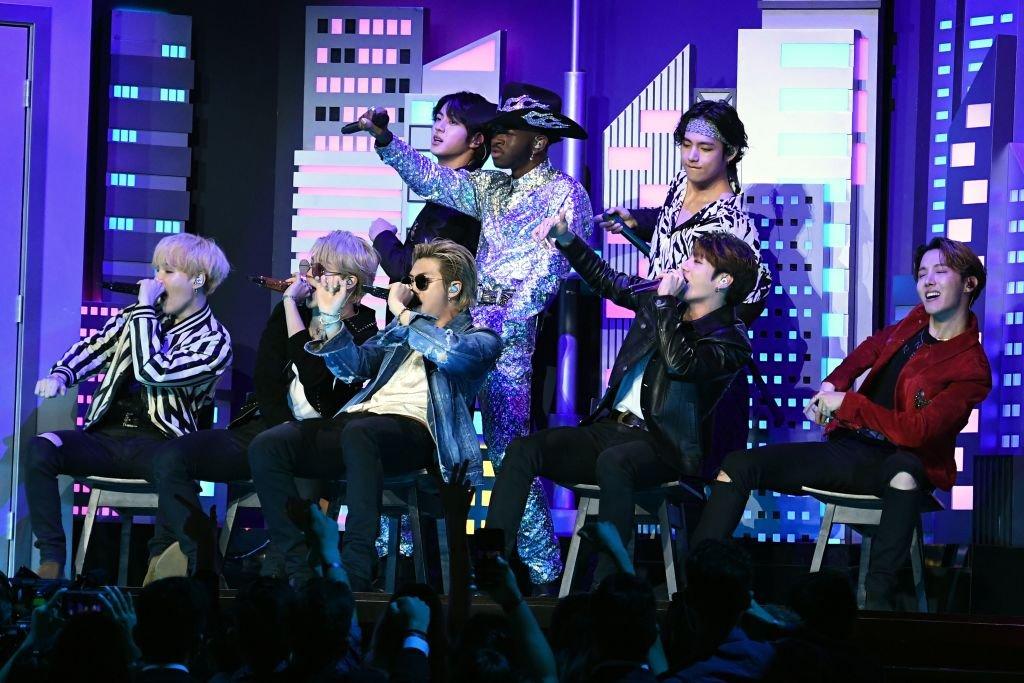
Lil Nas X and BTS
news
Lil Nas X, BTS & Billy Ray Cyrus Enter The "Old Town Road" Multiverse At The 2020 GRAMMYs
Lil Nas X, BTS & Billy Ray Cyrus Enter The "Old Town Road" Multiverse. Lil Nas also surprised the Grammys audience with massive fireworks and Queens emcee “Big” Nas, who popped up on stage to spit a verse on Lil Nas’ Cardi B-assisted "Rodeo"
The Atlanta native wore an iridescent cowboy suit while singing his Billboard record-breaking song, "Old Town Road." In a “who’s who” carousel of verses, the 20-year-old was accompanied by Billy Ray Cyrus, BTS, Mason Ramsey and Diplo. The original song saw its chart reign bolstered by various remixes featuring some of the aforementioned artists.
Lil Nas X also surprised the audience with massive fireworks and Queens emcee "Big" Nas, who popped up on stage to spit a verse on Lil Nas' Cardi B-assisted "Rodeo." This segment of the performance featured bone-breaking street dancers, which is a style often implemented by Southern-bred performers.
Lil Nas X & Billy Ray Cyrus Win Best Music Video For "Old Town Road" | 2020 GRAMMYS
Lil Nas X is already a two-time winner tonight. He was awarded Best Music Video and Best Pop Duo/Group Performance for "Old Town Road (feat. Billy Ray Cyrus)." He could find himself with a win in three of the Big Four categories, including Album of the Year for his EP, 7.
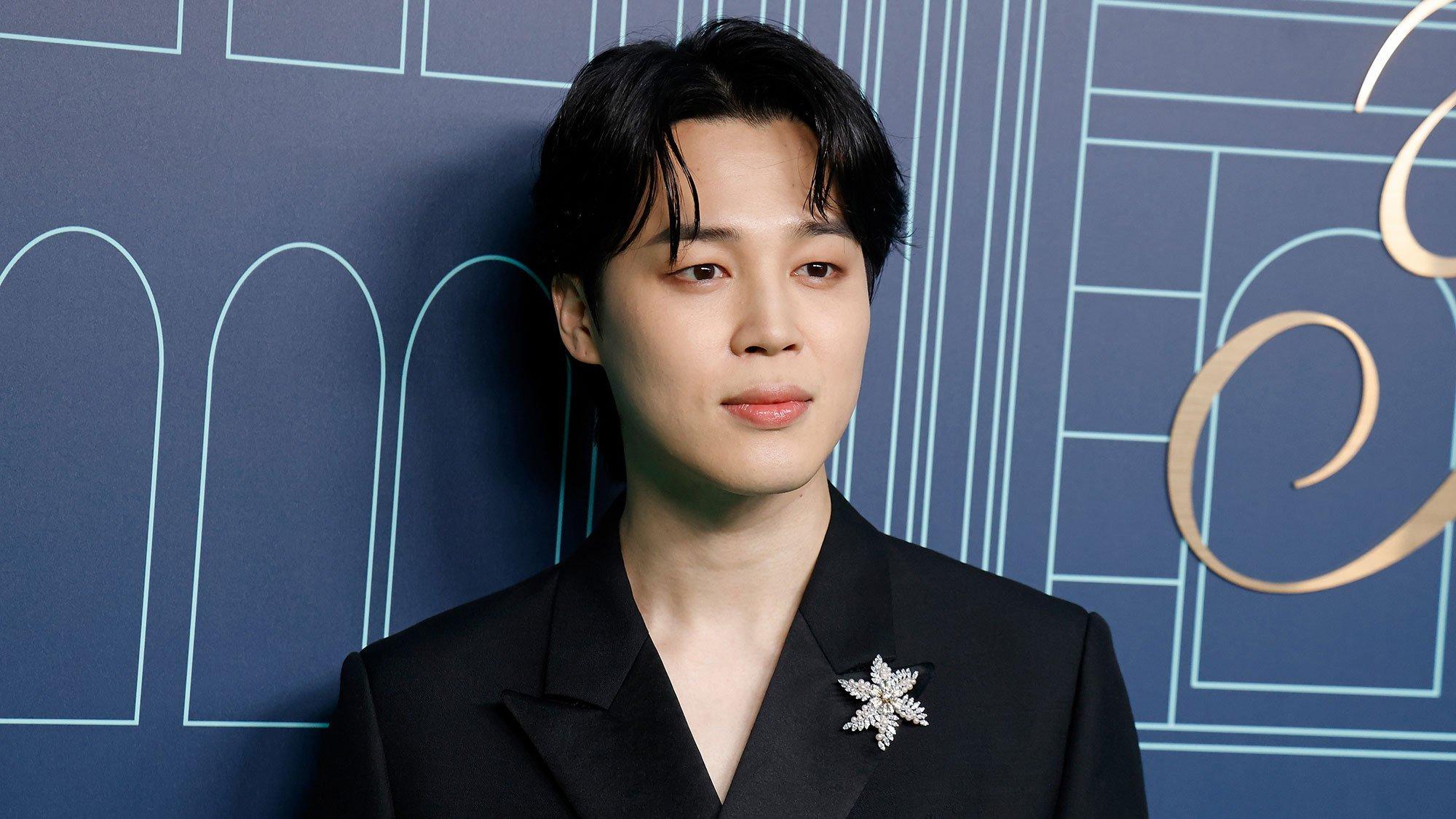
Photo: Taylor Hill/Getty Images
list
5 Takeaways from BTS Jimin's New Album, 'MUSE': A Bold Exploration Of Love And Inspiration
Jimin's second solo project, 'MUSE,' showcases his artistic growth and versatility, featuring a blend of nostalgic sounds, personal reflections, and standout collaborations.
K-pop juggernauts BTS are still on hiatus due to military enlistments, except for Jin, who was discharged last month. Yet, all members remain booked and busy in their solo endeavors.
Documentaries, travel shows, special singles — you name it, they carefully prepared it before starting their duties. And after new records from j-hope (HOPE on the Street) and RM (Right Place, Wrong Person) this year, the next in line is Jimin, who dropped MUSE today.
The album comes almost a year and a half after his debut EP, FACE, which placed Jimin as the first South Korean soloist to top Billboard's Hot 100 chart. In it, the Busan-born star proved his versatility and prowess standing on his own, captivating audiences old and new with his sensitive charisma.
In MUSE, Jimin introduces a new facet of his musical identity: bolder and more confident, but still a big softie at heart. To celebrate the beginning of a new era — and to ease the wait until his discharge next year — here are five key takeaways from Jimin's latest release, MUSE.
It's Another Jimin-Led Production
FACE was a proper introduction to Jimin's artistic vision, with him contributing to every aspect of the project and co-writing all of its tracks, minus the instrumental "Interlude: Dive."
Now, he takes it up a notch for MUSE, showcasing his growth by co-writing six out of seven tracks, and co-producing two of them: "Rebirth" and "Interlude: Showtime." Once again, Jimin had a hand on all of the album's components, including its concept and visuals, and bore down another layer of his ever-evolving skills.
If FACE introduced us to a vulnerable and sometimes desperate Jimin, MUSE charges forward with main pop boy energy, tender but commanding, sweet but sassy. It works both as a gift to fans and a tool to get to know Jimin even deeper.
He’s Still In Search Of His Muse
"We never met, but she's all I see at night/ Never met but she's always on my mind/ Wanna give her the world/ And so much more/ Who is my heart waiting for?" Jimin sings in MUSE's track, "Who." As the lyrics suggest, MUSE's main theme is Jimin's journey to find the source of his inspiration — his muse.
The album's seven tracks are all interconnected by love and longing, with Jimin searching for the one but getting lost in the way, and back at it once more. Through this perspective, he continues his path of self-discovery. After looking at his own FACE in the mirror, who else does he see? Who else instigates him enough to make art?
A Stellar Team Backs Up The Effort
To write and produce MUSE, Jimin enlisted longtime collaborators Pdogg, Ghstloop, Evan, and Supreme Boi. They have also been working with BTS for years, and know just what Jimin wants and needs in his songs.
But to make this album even more special, Jimin also collaborated with a fresh crop of professionals. Lead single "Who" was co-written and co-produced by Jon Bellion, Pete Nappi, and Tenroc, while Ayo the Producer and Kofo co-signed the fan-dedicated "Closer Than This." OneRepublic's Ryan Tedder helped pen "Be Mine," and Tommy Brown has writing credits on "Rebirth" and "Smeraldo Garden Marching Band (feat. Loco)."
Aside from Korean rapper Loco, MUSE also features American actress and singer Sofia Carson on the smooth duet "Slow Dance." Together, these names assembled a cohesive, yet diverse LP, brimming with influences from several decades, genres, and countries at once.
The Smeraldo Flower Makes A Comeback
Back in 2017, when BTS was in their LOVE YOURSELF era, they also introduced to their lore a fictional blue flower named Smeraldo. Symbolizing "a truth that cannot be told," its legend was better explored in the track "The Truth Untold (Feat. Steve Aoki)," and offered important clues to understanding that era's messages.
However, as years passed, the Smeraldo flower was largely forgotten from BTS's new works — until MUSE. Here, Jimin brings back the blue flower as one of the albums' visual concepts, and as the main motif behind pre-release "Smeraldo Garden Marching Band (feat. Loco)."
According to a press statement, the track's lyrics "express the longing to confess and find love on behalf of those unable to articulate their feelings," hence the use of Smeraldo. As for its curious title — loosely inspired by The Beatles' 1967 album Sgt. Pepper's Lonely Hearts Club Band — it came first as a casual nickname between Jimin, Pdogg, Ghstloop, and Evan while they worked together on FACE, and eventually became real.
It’s Packed With Nostalgia
If you miss Justin Timberlake's Justified sounds and other early-2000s gems, MUSE is here to take you on a nostalgic trip. Inspired by pop, R&B and hip hop from that era, Jimin gave his latest album a vintage, cozy veneer.
These references are predominantly visible on "Who" and its delightful guitar strums, but "Slow Dance (feat. Sofia Carson)," for example, sounds like an updated version of Usher and Alicia Key's "My Boo," and "Be Mine" could be the 2020's lovechild of Santana's "Maria Maria" and Sean Paul's "I'm Still In Love With You."
Another strain of references can be seen in "Smeraldo Garden Marching Band (feat. Loco)," which extends The Beatles' inspiration to experimental samples and marching band percussion, and creates a quirky piece that strays away from any current trends. "Interlude: Showtime" drinks from the same source, featuring a circus brass and drum line that introduces us to the singularity of "Smeraldo Garden."
While infused with nostalgia, MUSE still appeals to today's tastes, and offers a seamless, polished listen. It stands as a testament to Jimin's artistic growth, and while he might not have found his muse yet — he is certainly a source of inspiration for many.
More BTS News
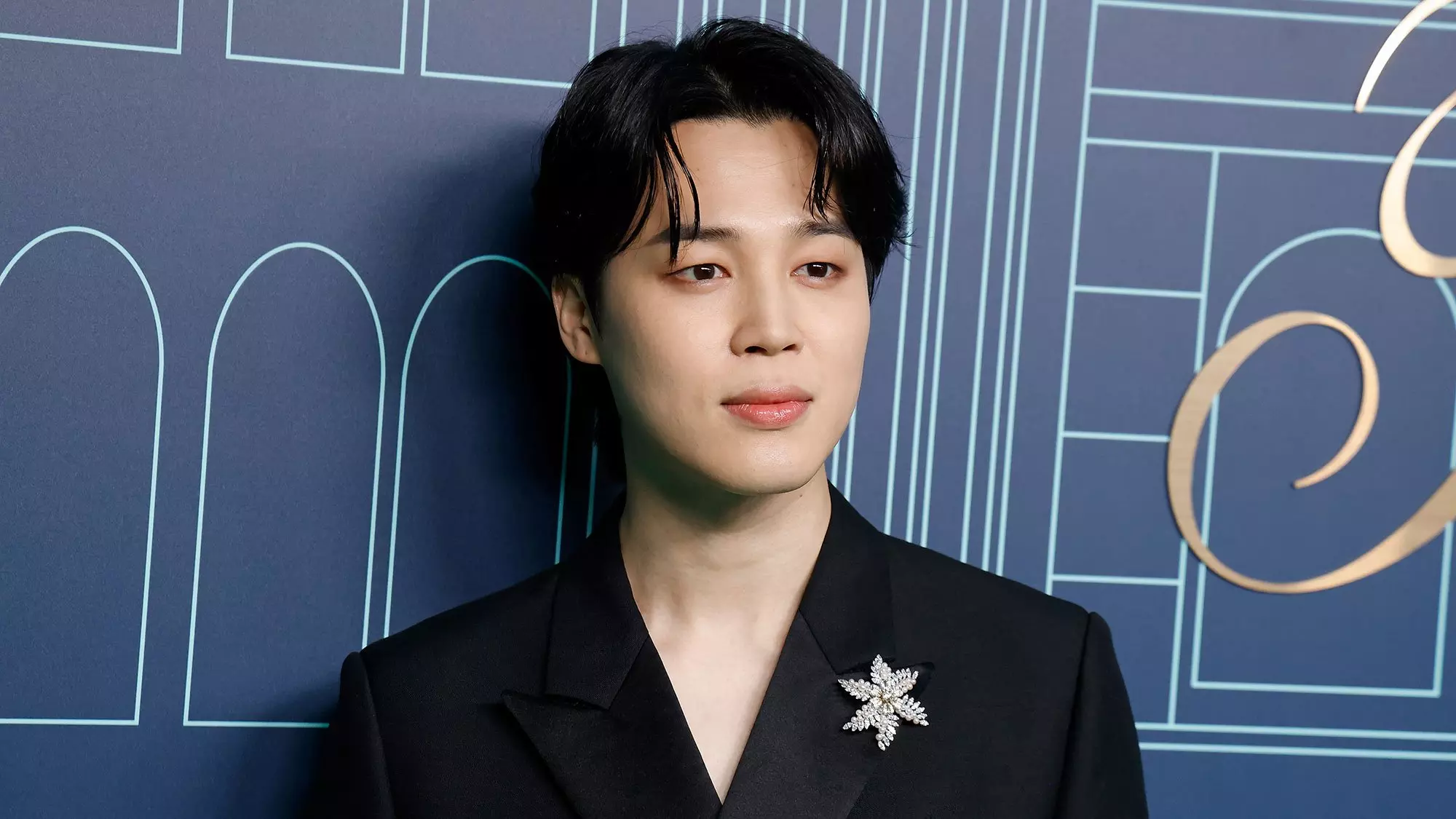
5 Takeaways from BTS Jimin's New Album, 'MUSE': A Bold Exploration Of Love And Inspiration

GRAMMY Museum Partners With HYBE For New K-Pop Exhibit 'HYBE: We Believe In Music' Opening Aug. 2
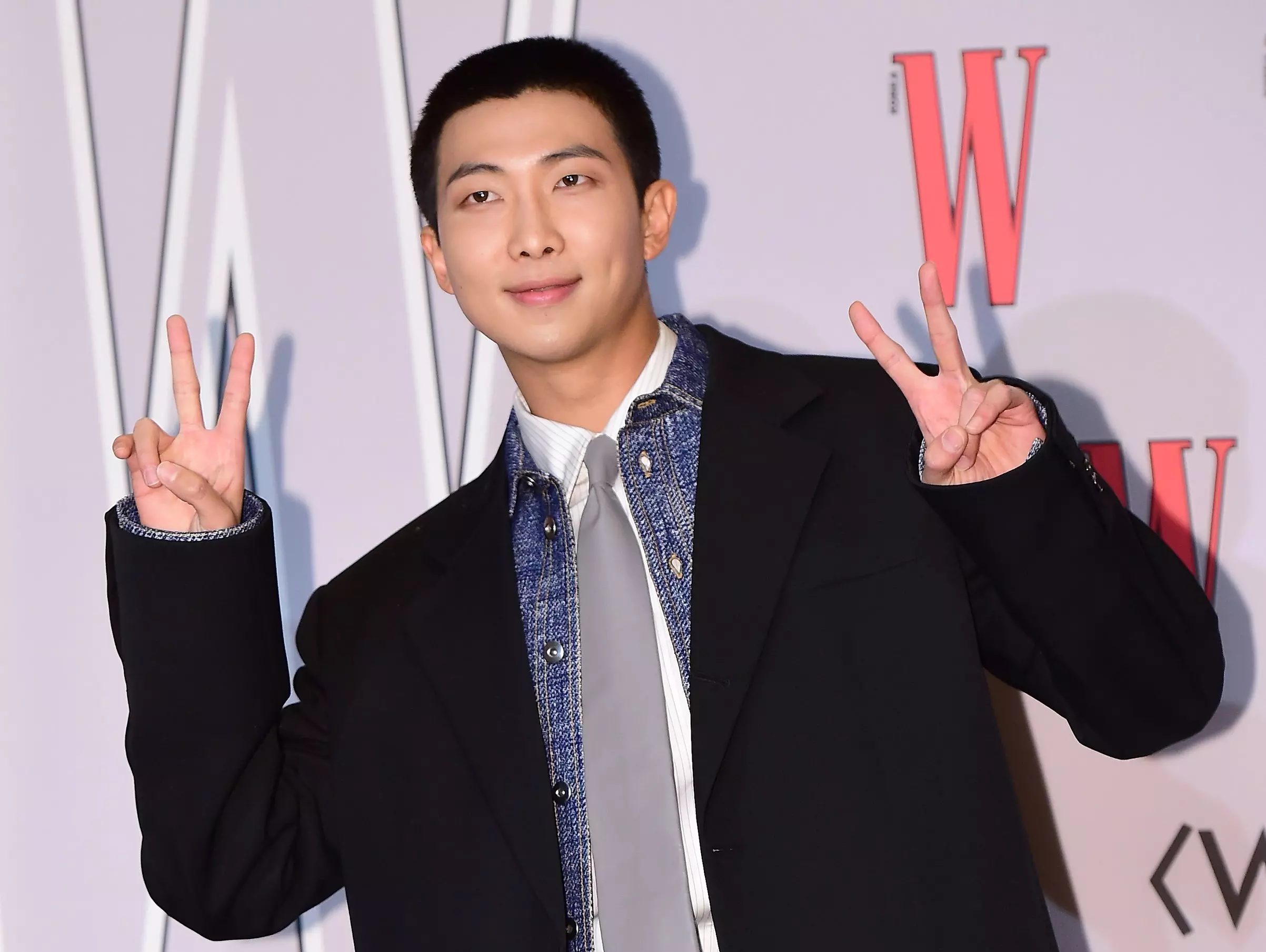
Stream RM's New Album 'Right Place, Wrong Person': See The Tracklist, "LOST!" Video & Special Guests
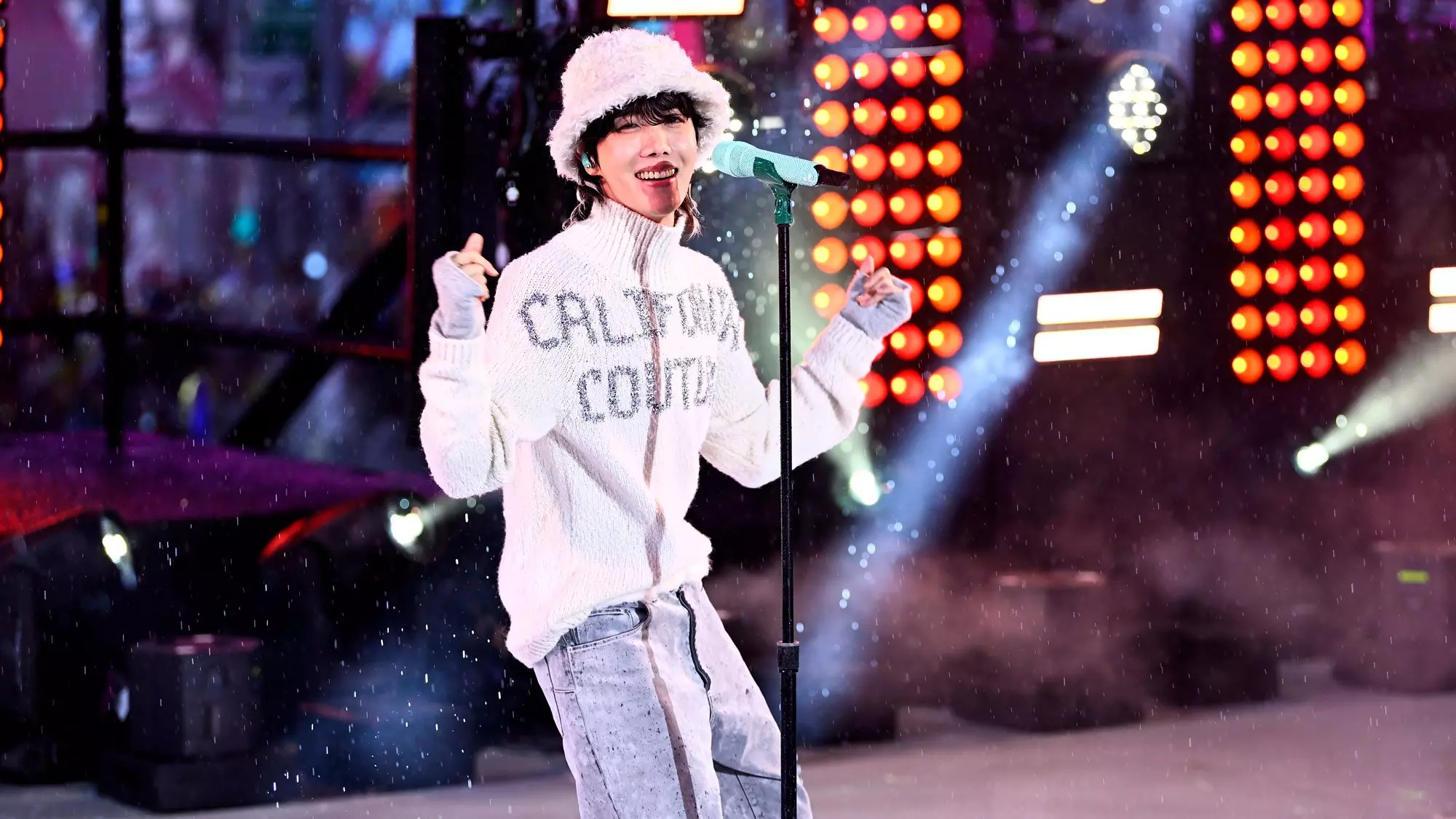
J-Hope's Road To 'Hope On The Street Vol.1,' From Falling Back In Love With Dance To Tying Together His Global Influences
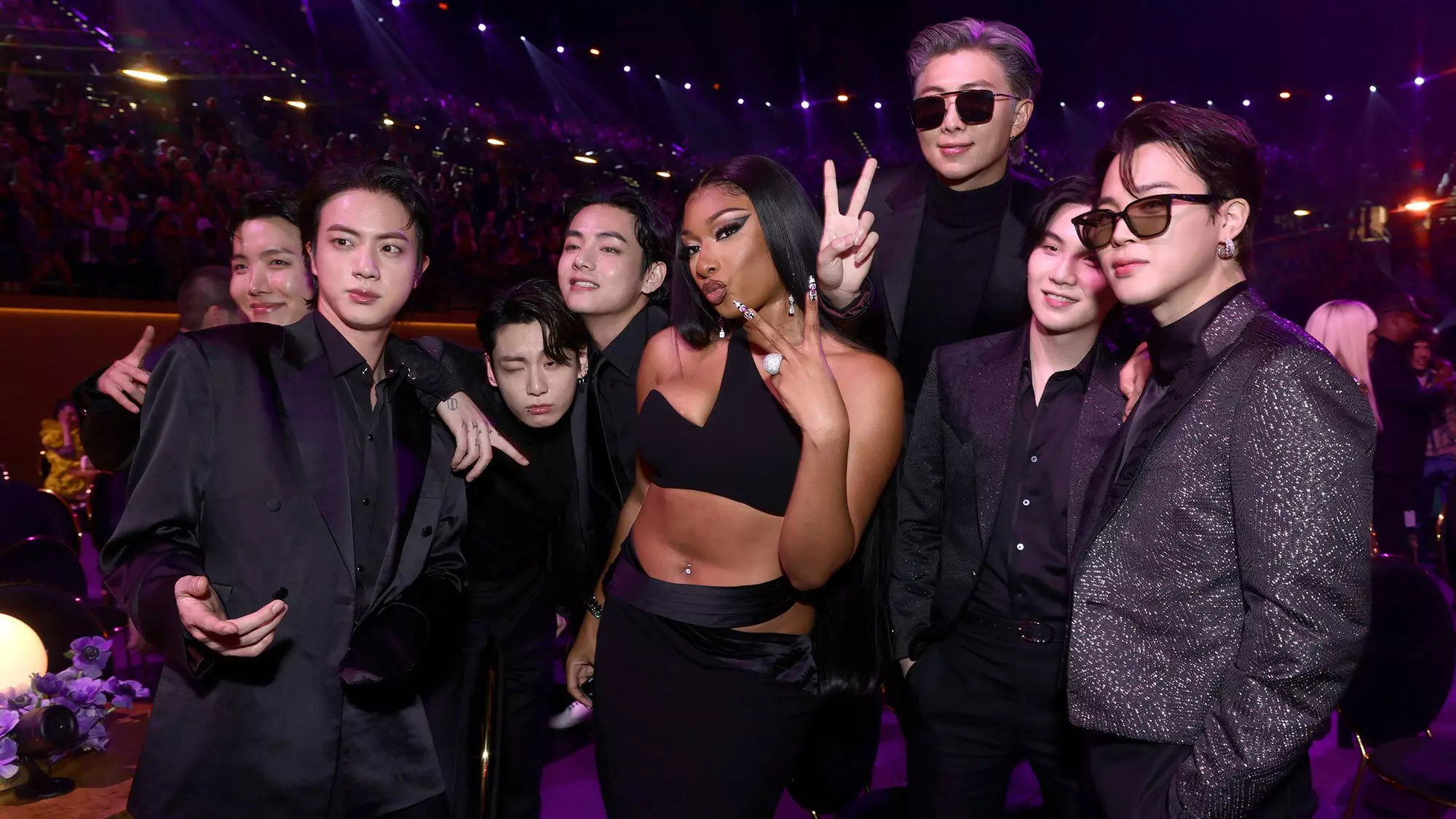
9 Essential K-Pop/Western Collabs: From BTS And Megan Thee Stallion, To IVE And Saweetie
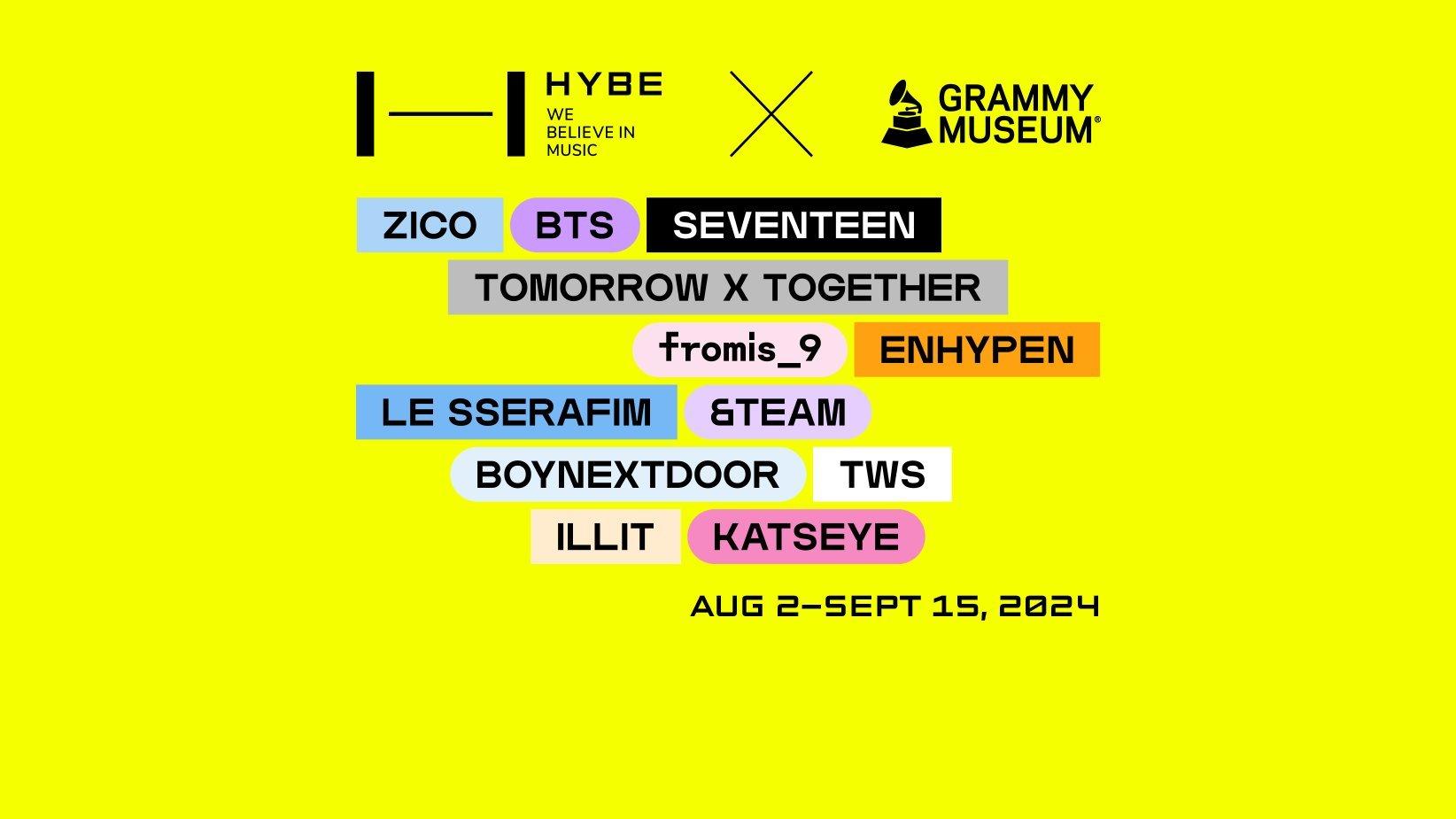
Graphic courtesy of the GRAMMY Museum
news
GRAMMY Museum Partners With HYBE For New K-Pop Exhibit 'HYBE: We Believe In Music' Opening Aug. 2
Running Aug. 2 through Sept. 15, the GRAMMY Museum exhibit showcases artifacts from superstar HYBE artists, including BTS, SEVENTEEN, TOMORROW X TOGETHER, ENHYPEN, LE SSERAFIM, and many more.
The GRAMMY Museum joins forces with HYBE to present its newest exhibit, HYBE: We Believe In Music, A GRAMMY Museum Exhibit. This interactive exhibit chronicles the history and impact of HYBE, and showcases its legacy of unparalleled innovation and creativity as a trend-setting global entertainment brand.
The exhibit opens on Aug. 2 in downtown Los Angeles and features spotlight moments with K-pop stars BTS, SEVENTEEN, TOMORROW X TOGETHER, ENHYPEN, LE SSERAFIM, and many more. "HYBE: We Believe In Music" runs through Sept.15. The exhibit will kick off on Aug. 1 with "Global Spin Live: TWS," a program featuring a moderated conversation with K-pop group TWS, followed by a performance.
The exhibit traces HYBE's evolution and influence by showcasing instantly recognizable artifacts from its roster of artists, creators, and fans. The displays notably feature original outfits worn in iconic music videos such as "Yet To Come (The Most Beautiful Moment)" by BTS, "MAESTRO" by SEVENTEEN, "Sugar Rush Ride" by TOMORROW X TOGETHER, "Sweet Venom" by ENHYPEN, and "EASY" by LE SSERAFIM. HYBE: We Believe In Music also boasts accessories and performance gear donned by ZICO, fromis_9, BOYNEXTDOOR, TWS, &TEAM, and ILLIT. The exhibit marks the first time these artifacts will be on display together in one location.
Other highlights include interactive sing-along and dance rooms, a dedicated Fan Section celebrating the endless support between HYBE artists and their fandoms, a Mono to Immersive room featuring BTS's 2022 GRAMMYs performance of "Butter," and a Photoism Booth that allows visitors to pose alongside their favorite K-pop artists. The GRAMMY Museum exhibit will also feature exclusive video content with producers, artists, music videos, and more.
"HYBE and their artists represent the present and future of the global music landscape, and our goal with this exhibit is to deepen the appreciation and respect for its creators and performers," says Michael Sticka, President/CEO of the GRAMMY Museum. "HYBE has contributed to creating a playground of innovation that inspires fandoms that transcend age, gender, geography and beyond. The GRAMMY Museum is thrilled to provide a space where fans can express their love for K-pop and feel closer to their favorite idols."
Read more: 11 Rookie K-Pop Acts To Know In 2024: NCT Wish, RIIZE, Kiss Of Life & More
HYBE Chief Operating Officer Taeho Kim added, "Putting out an exhibition that captures HYBE's journey is a new experience for us. We're very excited about this partnership with GRAMMY Museum, and we look forward to welcoming music fans who visit the museum to enjoy and connect with our historical pieces."
The exhibit highlights the roots of HYBE's meteoric rise. In 2005, South Korean producer, composer, and songwriter Bang Si-Hyuk, known as "hitman" Bang, changed the trajectory of Korean pop music by launching the record label Big Hit Entertainment. He soon signed a talented 16-year-old rapper named RM, which became the first step in creating the label's groundbreaking boy band — BTS. With the group's global success, "hitman" Bang and Big Hit Entertainment became known as musical trailblazers and record industry innovators. Big Hit Entertainment has now evolved into HYBE, which only continues to break boundaries in music and beyond.
More K-Pop News
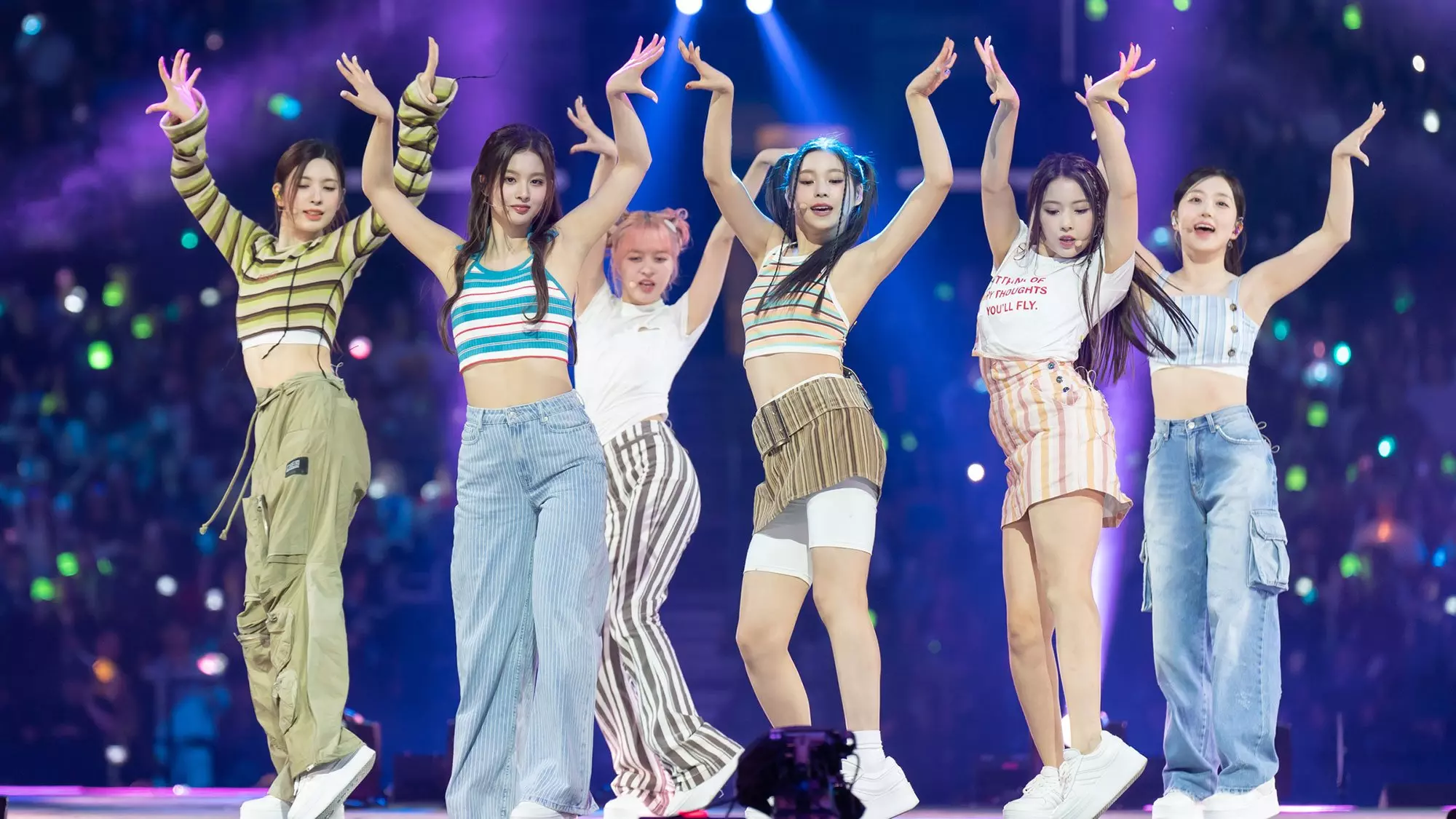
KCON L.A. 2024 Returns: Get Ready With This Playlist Featuring NCT 127, Zerobaseone, ENHYPEN, Zico & More
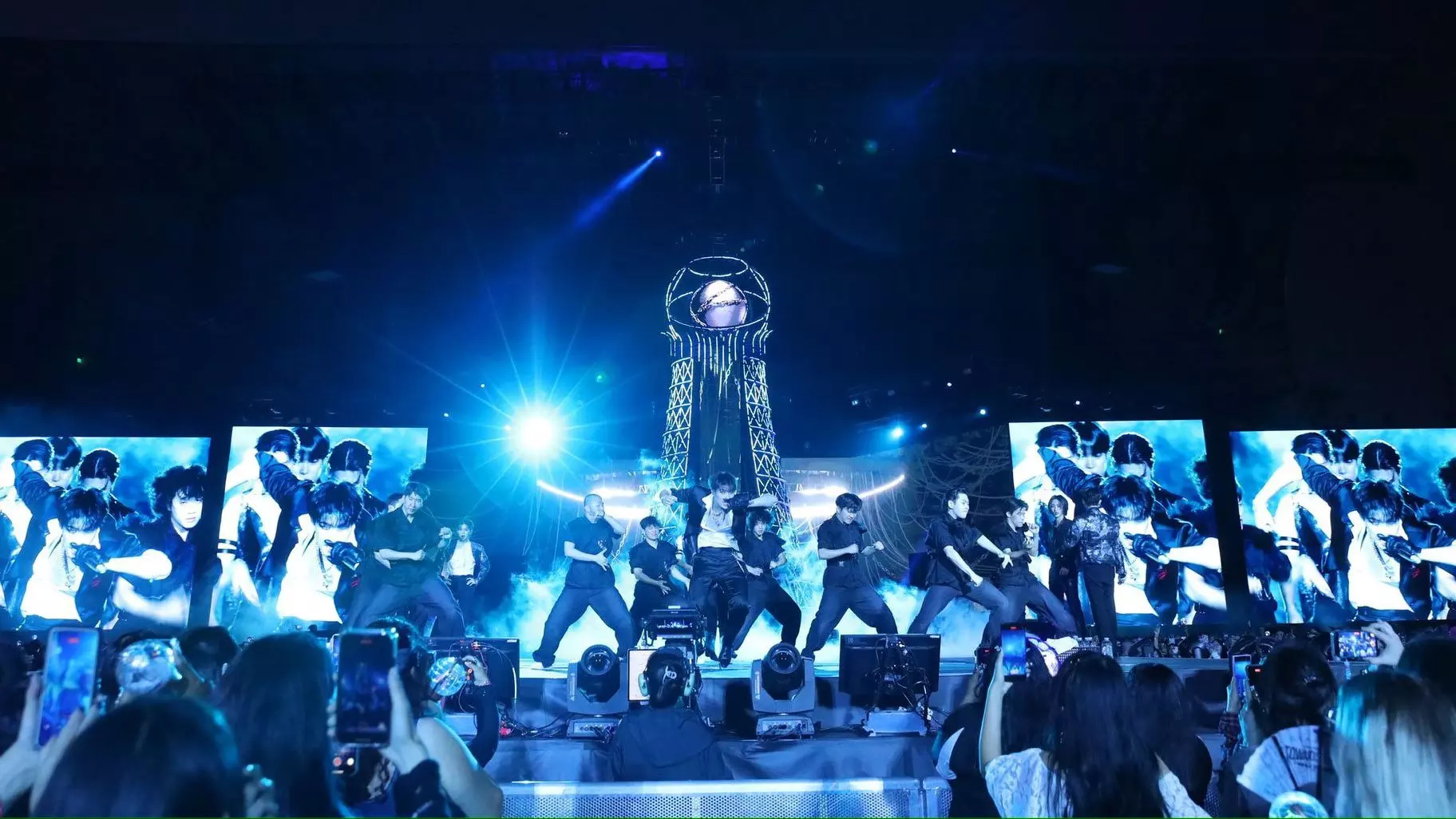
ATEEZ’s First U.S. Stadium Show Was A Triumph & Testament To Their Growth

5 Takeaways from BTS Jimin's New Album, 'MUSE': A Bold Exploration Of Love And Inspiration

NCT 127 Essential Songs: 14 Tracks You Need To Know From The K-Pop Juggernauts

ENHYPEN And JVKE "Say Yes" To Cross-Cultural Collabs & Exploring New Genres
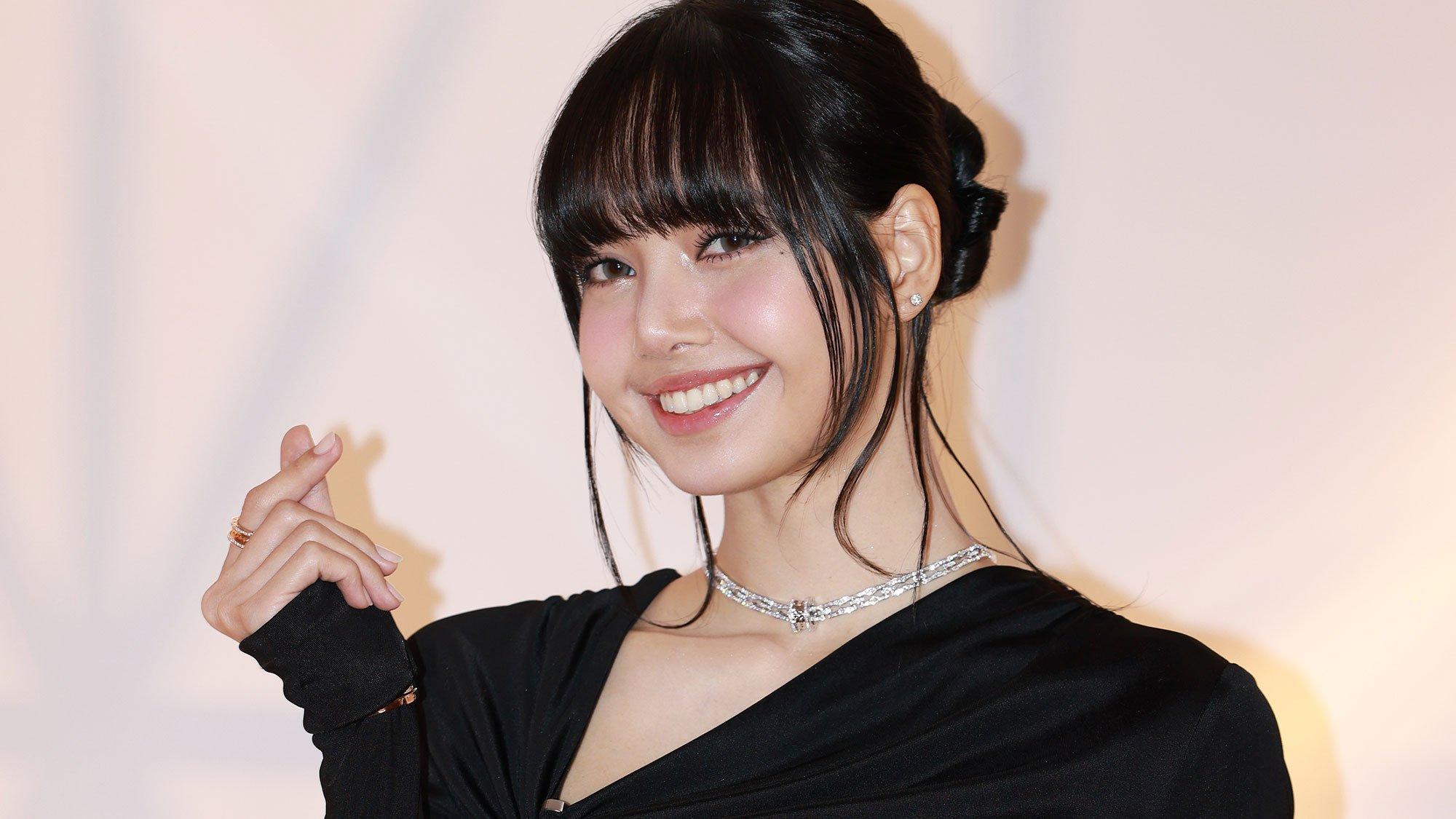
Photo: The Chosunilbo JNS/Imazins via Getty Images
list
New Music Friday: Listen To New Songs From LISA From Blackpink, Lil Nas X, Kelsea Ballerini, MC Lyte & More
Hot summer days require even hotter tunes. Here are some fresh-out-the-oven songs and albums by Hiatus Kaiyote, Lucky Daye, Headie One, Kaitlin Butts, and more.
We’ve been feeling the heat for a minute now, but summer is finally, officially, upon us.
What do you have on deck to soundtrack it? Perhaps you’re checking out Camila Cabello’s fourth offering, C,XOXO. Or Jxdn’s expectations-bucking new album, When the Music Stops. And there are so many other worthy candidates for your playlist — from Lupe Fiasco’s Samurai to Omar Apollo’s God Said No.
No matter where your stylistic compass points, this Friday release day has got something for you. As you gather your sunscreen and shades, let’s breeze through a cross-section of what’s out there.
LISA — "Rockstar"
K-pop loves its solo releases, showcasing how the various members of a group can shine individually while combining with ecstatic chemistry. Enter LISA, one-fourth of Korean titans BLACKPINK, who's already turned heads with her 2021 debut album, Lalisa.
"Rockstar" is another swing outside her main gig, featuring serrated chiptune production and LISA's commanding rap flow. The gritty, urban, futuristic video is a visual treat, and the chorus's boast of "Lisa, can you teach me Japanese?" is a multilingual flex — as well as a maddeningly unshakeable earworm.
Kelsea Ballerini & Noah Kahan — "Cowboys Cry Too"
The "Peter Pan" heavyweight and four-time GRAMMY nominee Kelsea Ballerini has called 2024 "a new chapter of music." Her collaboration with folk/pop singer/songwriter Noah Kahan, "Cowboys Cry Too," is the tip of the spear.
More than a month after the pair performed together at the 2024 Academy of Country Music Awards, their first recorded team-up is an aching, yearning ballad about breaking down a gruff exterior and revealing true emotions.
"Cowboys cry too/ They may not let 'em fall down in their hometown thinkin' they still got s*** to prove," Ballerini sings in the chorus. "That well runs deep/ But when he's showin' his skin, lettin' mе in, that's when he's toughest to mе."
Lil Nas X — "Here We Go!" (from the Netflix film 'Beverly Hills Cop: Axel F')
"So excited to release the best song of all time this friday!," Lil Nas X proclaimed on Instagram. (And on a Beverly Hills Cop soundtrack, no less!)
"Here We Go!" comes at an inflection point for the "J Christ" singer: "sorry I've been so scared with my art lately," he added in the same post. "I'm coming around to myself again. I will make you guys very proud."
This pro forma banger certainly inspires pride: tenacious lines like "I'm livin' and livin' I wanna die/ They tryna get even/ I'm beatin' the odds" will get under your skin. As for Beverly Hill Cop: Axel F, the Eddie Murphy joint will whiz to your screen July 3 via Netflix.
Lucky Daye — 'Algorithm'
Lucky Daye picked up a win for Best Progressive Album at the 2022 GRAMMYs, for Table for Two. After a slew of nominations for work with Beyoncé and Mary J. Blige, he's investigating the Algorithm.
The single "HERicane" was just a teaser, with songs like "Blame," featuring Teddy Swims; "Paralyzed," featuring RAYE;" and "Diamonds in Teal" expanding on and honing his soul-funk-R&B vision.
"Don't know pickin' sides/ 'Cause I'm rollin' in desire," he dreamily sings in the gently roiling "Diamonds in Teal." "I don't know which lie's true/ Or maybe I do, or maybe I'm you." It's a suitable mission statement wrapped in a stealthily seductive package.
Hiatus Kaiyote — 'Love Heart Cheat Code'
A jazzy, soulful, psychedelic band of Aussies, Hiatus Kaiyote has been wowing audiences for more than a decade. Whether through sampling or features, they've crossed paths with Drake, Anderson .Paak, and Beyoncé and Jay-Z.
Love Heart Cheat Code builds brilliantly on their last three albums: their 2012 debut Tawk Tomahawk, 2015's Choose Your Weapon, and 2021's Mood Valiant. Tracks like "Telescope," "Everything's Beautiful," and "Make Friends" are burbling brooks of atmosphere, groove and vibe.
Boulevards — 'Carolina Funk: Barn Burner on Tobacco Road'
Any fans of deep, pungent funk grooves should investigate Boulevards immediately. The project of mastermind Jamil Rashad, their new album Carolina Funk: Barn Burner on Tobacco Road tips its hat to yesterday's funk with a contemporary twist, bringing a refreshing spin on the well-trod template of syncopated basslines and stabbing horns.
Across highlights like "Do It Like a Maniac Part 1&2" and "Run & Move," Boulevards shows — once again — that few can nail this gritty sound quite like Rashad and crew.
Headie One — 'The Last One'
British drill-inflected MC Headie One first made a splash overseas with his 2023 debut album, Strength to Strength. Less than a year later, he's returning with The Last One.
Back in 2022, he hinted at the existence of his sophomore album in his non-album track "50s" — "The fans calling for 'Martin's Sofa'/ It might be the first single from my second," he rapped.
Helmed by that single, The Last One features Potter Payper, Stormzy, Fridayy, Skrillex, and more. The album is a leap forward in terms of production, scale and exploration.
Katlin Butts — 'Roadrunner!'
Any theater kid worth their salt knows at least a few bars from the musical "Oklahoma!"; country sensation Kaitlyn Butts has just unfolded it into an entire album.
"It's a love story but there's also a murder and a little bit of an acid-trippy feel to it at times; it's set in the same place where I come from," she said in a statement, noting she saw "Oklahoma!" with her parents every summer during childhood. "Once I got the idea for this album," she continued, "I couldn't believe I hadn't thought of it before, and it turned into something that completely encompasses who I am and what I love."
A laugh riot as well as a colorful, openhearted statement, Roadrunner! does the old Rodgers and Hammerstein chestnut good.
Read more: 5 Female Artists Creating The Future Of Country Music: Jaime Wyatt, Miko Marks & More
Amaarae — 'roses are red, tears are blue — Fountain Baby Extended Play'
Futurist Afropopper Amaarae made a gigantic splash with her second album, 2023's Fountain Baby — even Pitchfork gave it their coveted Best New Music designation.
That lush, enveloping album just got an expansion pack: roses are red, tears are blue — A Fountain Baby Extended Play is a continuation of its predecessor with six new songs. The oceanic "wanted," featuring Naomi Sharon, is a highlight, as is a remix of "Disguise" with 6LACK.
"Ooh, I'll be wanted/ I've been wanted," a pitch-shifted Sharon sings near the end, as if turning over the phrase. "Wanted" is one way to describe Amaraae's position in the music landscape.
Learn more: Meet The Latest Wave Of Rising Afrobeats Stars: AMAARAE, BNXN, Oladapo & More
MC Lyte — "King King" (feat. Queen Latifah)
The 50th anniversary of hip-hop may have come and gone, but hip-hop is forever. Today, legendary hip-hop pioneers MC Lyte and Queen Latifah continue to bear the flame of the genre as an elevating force with "King King," a conscious, uplifting offering.
"This is dedicated to all the kings and all the soon to be kings/ We're counting on you/ We love you/ This is for you, you and you and you," MC Lyte begins, while Latifah holds it down on the chorus with "This your crown hold it/ Even if it all falls down show it/ You know the world is watching now I know you get tired from keepin' it all together/ We need you."
During Women's History Month in March, MC Lyte released "Woman," the first single from her upcoming album, featuring hip-hop icons Salt (of Salt 'N Pepa), Big Daddy Kane, and R&B singer Raheem DeVaughn. MC Lyte's first new album in nearly a decade drops this summer; keep your eyes and ears peeled.
Learn more: 9 Teen Girls Who Built Hip-Hop: Roxanne Shante, J.J. Fadd, Angie Martinez & More
Latest News & Exclusive Videos

2024 Paris Olympics Opening Ceremony: Watch Celine Dion, Lady Gaga, Gojira & More Perform

Ice Spice Is The Drill Queen On 'Y2K!': 5 Takeaways From Her Debut Album

New Music Friday: Listen To New Songs From Halsey, MGK And Jelly Roll, XG & More

Watch Young MC Win Best Rap Performance In 1990

The Red Clay Strays Offer A New Kind Of Religion With 'Made By These Moments'
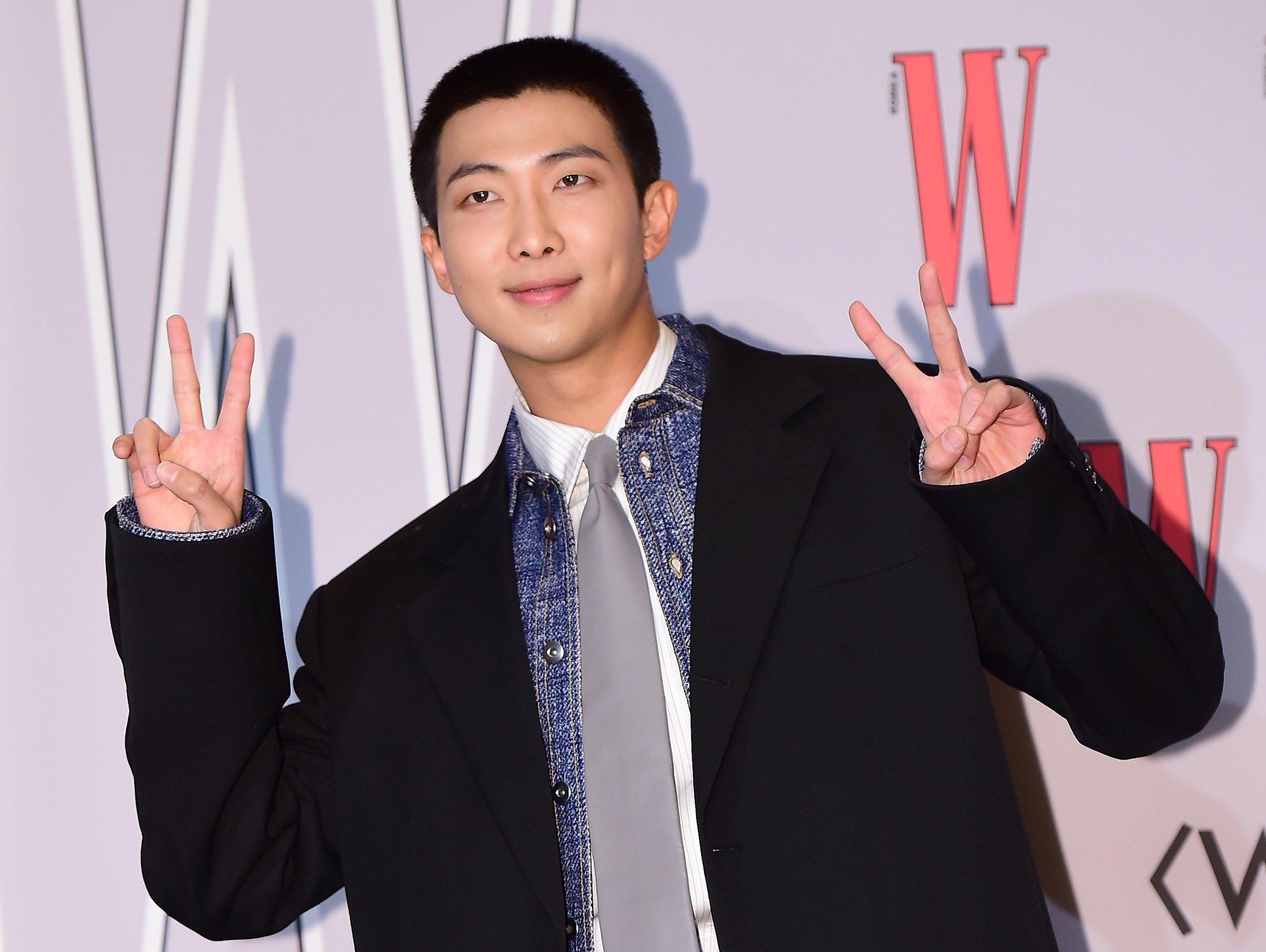
Photo: The Chosunilbo JNS/Imazins via Getty Images
news
Stream RM's New Album 'Right Place, Wrong Person': See The Tracklist, "LOST!" Video & Special Guests
The second solo album from BTS' RM further displays his knack for genre-bending experimentation, while also delving deeper into his vulnerable side. Listen to the new album here, and get to know the project's featured artists, tracklist and more.
As the world patiently awaits the return of BTS in full force, each member continues to deliver solo projects to show off their individual talents. And 18 months after his last album, RM is back.
With a discography that hops between pop, R&B, and hip-hop, RM returns to the spotlight with his second solo album, Right Place, Wrong Person. The project tells the relatable story of an individual who is a creature of habit, but slowly comes to find solace in foreign spaces.
Below, listen to RM's latest album, and discover more about how he's revealing a new side of his artistry with Right Place, Wrong Person.
The Tracklist
After RM's debut solo album, 2022's Indigo, had 10 tracks (including features from the likes of Erykah Badu, Anderson .Paak), he ups the tally with an 11-song tracklist this time around.
Here is the complete tracklist for Right Place, Wrong Person:
1. Right People, Wrong Place
2. Nuts
3. out of love
4. Domodachi (feat. Little Simz)
5. ? (Interlude)
6. Groin
7. Heaven
8. LOST!
9. Around the world in a day (feat. Moses Sumney)
10. ㅠㅠ (Credit Roll)
11. Come back to me
The Creative Visuals
Two weeks before the album dropped, he unveiled the music video for "Come Back to Me," the lead single from Right Place, Wrong Person. Directed by the critically acclaimed actor Lee Sung Jin, the music video narrates the tale of feeling like an outsider and yearning for a sense of belonging in unfamiliar surroundings.
Then, on the day Right Place, Wrong Person arrived, RM added to release-day excitement with another intriguing visual, this time for "LOST!" The five-minute clip sees RM as the star of "The Lost! Show," where he and a group endure an eerie whirlwind of scenarios they can't seem to get out of. It's equal parts dramatic and slapstick, and another clever display of RM's creative versatility.
Noteworthy Guests
The featured artists on Right Place, Wrong Person — British rapper Little Simz on "Domodachi" and art-pop artist Moses Sumney on "Around the world in a day" — underscore RM's ability to interlace his own musical style with artists from various genres.
The album also has some notable behind-the-scenes collaborators as well. Production credits include Kim Han-joo, keyboardist and vocalist from the South Korean rock band Silica Gel, on "LOST!" and GRAMMY-nominated jazz duo DOMi & JD Beck on "? (Interlude)."
On "Come back to me" — which RM initially debuted last August during a surprise performance at BTS bandmate Suga's encore concert in Seoul — he delves into the album's central theme of wanting to venture into unknown areas, but feeling the intense urge to stay with what's already known. The track was composed and arranged by OHHYUK from the South Korean indie-rock band Hyukoh, but also features credits from artists Kuo, JNKYRD, and San Yawn.
But no matter who RM is working with, his own talent and prowess as a creator always shines. Right Place, Wrong Person presents a diverse array of tracks marked by sheer vulnerability, honesty, and sensitivity — a masterful continuation of a remarkable solo journey.
K-Pop Summer 2024 Guide: ATEEZ, IU, TXT & More Live In Concert & On Tour
